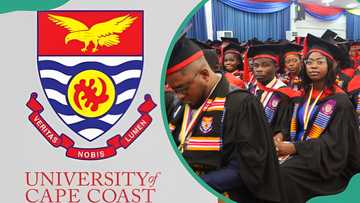The Kwame Nkrumah University of Science and Technology (KNUST) was established in 1951. Initially, it had a handful of students, but it has since grown to a population of over 63,000 scholars. The institution offers programs ranging from art, law, business, technology, and science. Discover all general arts courses offered at KNUST below.
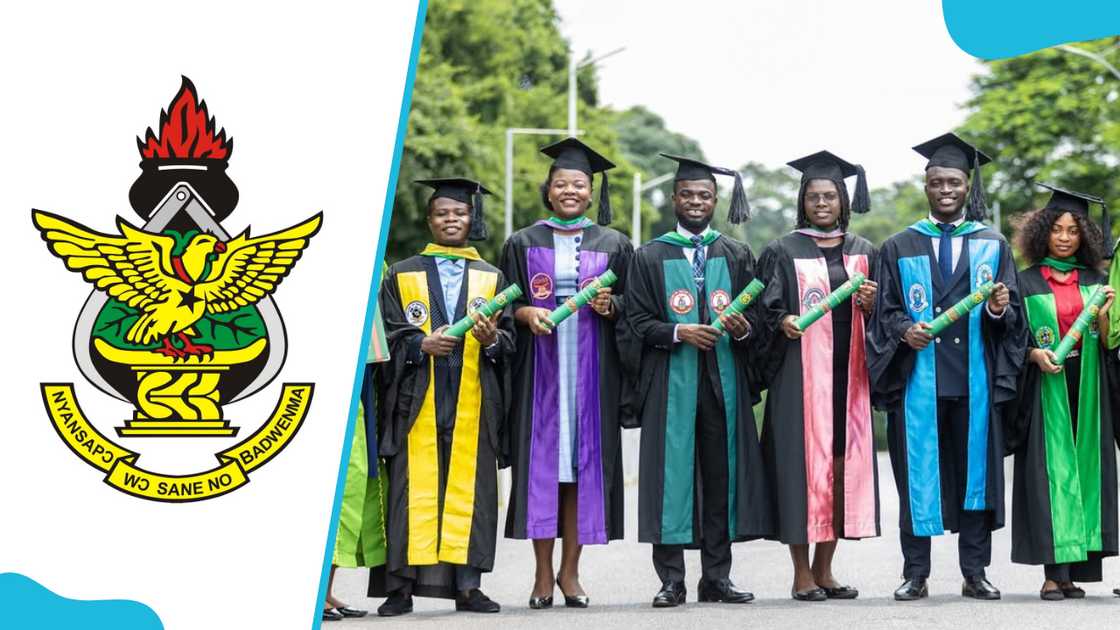
Source: UGC
TABLE OF CONTENTS
Key takeaways
- KNUST offers a variety of general arts courses within its College of Art and Built Environment.
- KNUST’s College of Art and Built Environment provided an ideal environment for teaching, research, and practical training for a better understanding.
- The Faculty of Arts is recognized as a leading institution in Sub-Saharan Africa for art education and training.
All general arts courses offered in KNUST in 2026
KNUST is one of the best universities you can enroll in in Ghana. Its Faculty of Art is one of three faculties in the school’s College of Art and Built Environment.
The faculty is further divided into five departments, each offering specific courses. Below is a comprehensive list of the courses provided at KNUST for general arts students:
1. Department of Communication Design
The goal of the Department of Communication Design is to excel in teaching, learning, and research within graphic arts and multimedia applications. The department offers programmes that are interdisciplinary and flexible. The available programmes are:
- Bachelor of Arts in Communication Design
- Master of Communication Design
- Master of Philosophy in Communication Design
- Doctor of Philosophy in Visual Communication Design
2. Department of Industrial Art
The primary responsibility of the Department of Industrial Art is to educate skilled professionals capable of overseeing the nation’s industries. The department runs six undergraduate programmes and ten postgraduate programmes.
- Bachelor of Fine Arts (BFA)
- Bachelor of Science (Hons) in Ceramic Technology
- Bachelor of Science (Hons) in Fashion Design
- Bachelor of Arts (Hons) in Integrated Rural Art and Industry
- Bachelor of Science (Hons) in Metal Product Design Technology
- Bachelor of Arts (Hons) in Textile Design and Technology
- Master of Fine Arts in Ceramics
- Master of Philosophy in Ceramic Technology
- Doctor of Philosophy in Ceramic Technology
- Doctor of Philosophy in Fashion Design Technology
- Master of Philosophy in Fashion Design Technology
- Master of Philosophy in Integrated Art
- Master of Fine Arts in Jewellery and Metalsmithing
- Master of Fine Arts in Textile Design
- Master of Philosophy in Textile Design Technology
- Doctor of Philosophy in Textile Design Technology
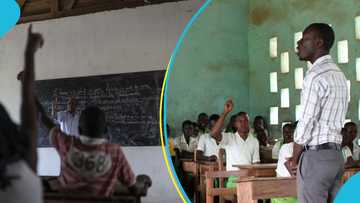
Read also
SHS Science students to stop studying Core Maths, Integrated Science from 2024/2025 academic year
3. Department of Integrated Rural Art and Industry
The Department of Indigenous Art and Technology aims to develop creative enterprises within the visual arts, crafts, and public art sectors. The department offers specialized training, mentoring, advice, information, and marketing services. The programmes available include:
- Bachelor of Arts in Integrated Rural and Industrial Arts
- Postgraduate Diploma in Integrated Art and Industry
- Master of Arts in Integrated Art and Industry
4. Department of Painting and Sculpture
The Department of Painting and Sculpture only offers one undergraduate programme, a BA in Painting and Sculpture. To pursue this course, you must attain five (5) credits at O’ Level, including Art, English Language, and Mathematics.
5. Department of Publishing Studies
The Department of Publishing Studies offers BA Publishing Studies geared towards employability and leadership, combining soft and hard skills.
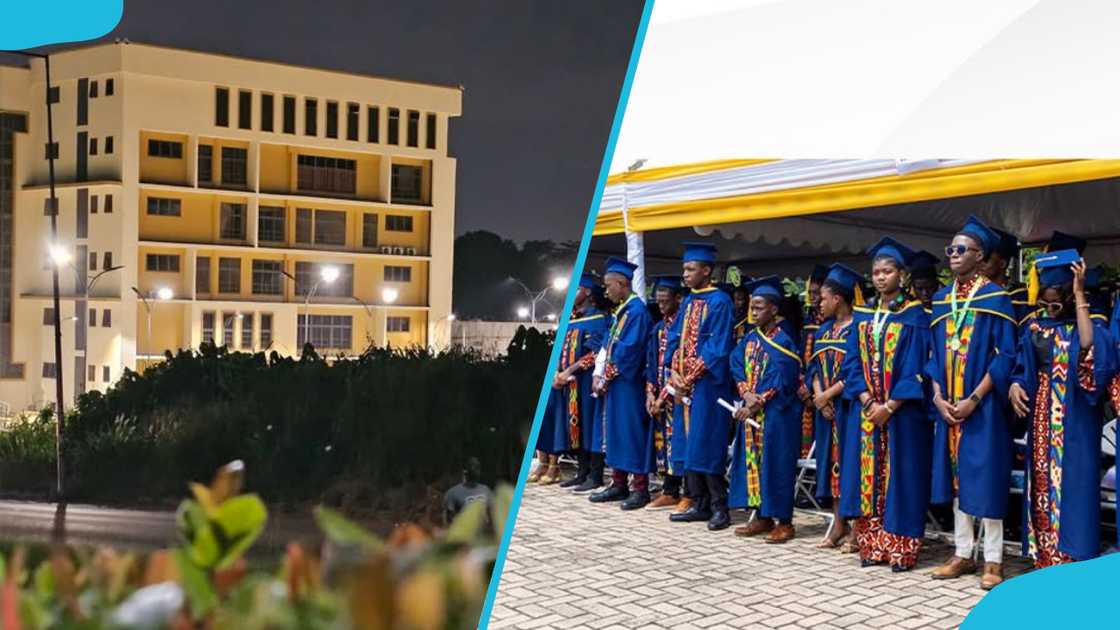
Source: UGC
Other general arts courses in KNUST
The institution also provides courses on weekends and through online platforms. You can choose to study any of these postgraduate courses.
- Master of Fine Arts in Painting
- Master of Fine Arts in Painting and Sculpture
- Master of Fine Arts in Sculpture
- Master of Fine Arts in Ceramics
- Master of Philosophy in Publishing Studies (Top-Up)
- Master of Arts in Art Education (Sandwich)
- Master of Arts in Art Education (Weekend)
- Master of Philosophy in Educational Innovation and Leadership Science (Weekend)
- Doctor of Philosophy in Art Education (Weekend)
KNUST courses requirements
To join the institute, you ought to meet the bare minimum requirements. They differ from one programme to another. Here are the KNUST course requirements for undergraduate, master’s, and PhD students.
Undergraduate general arts programmes
In addition to attaining the needed cut-off points outlined above, you also need the following:
- Three credits in core subjects. They include the English language, Mathematics, and Integrated Science.
- The credits in three other elective subjects are related to the general art programme you want to take.
- You should not score grades E8 and F9.
- If you are an International Baccalaureate holder, you must have grade 4 and above in any three relevant subjects at a higher level.

Read also
Tertiary Business Sense Challenge: UEW defeats UCC, KNUST to win version 5.0, gets GH¢8,000
Master’s general arts programmes
- A bachelor’s degree or its equivalent from an accredited institution
- The degree must be of at least first-class or second-class lower division
PhD general arts programmes
- A master’s degree or its equivalent from an accredited university
- You must have evidence that you were adequately trained and can study the programme you are applying for.
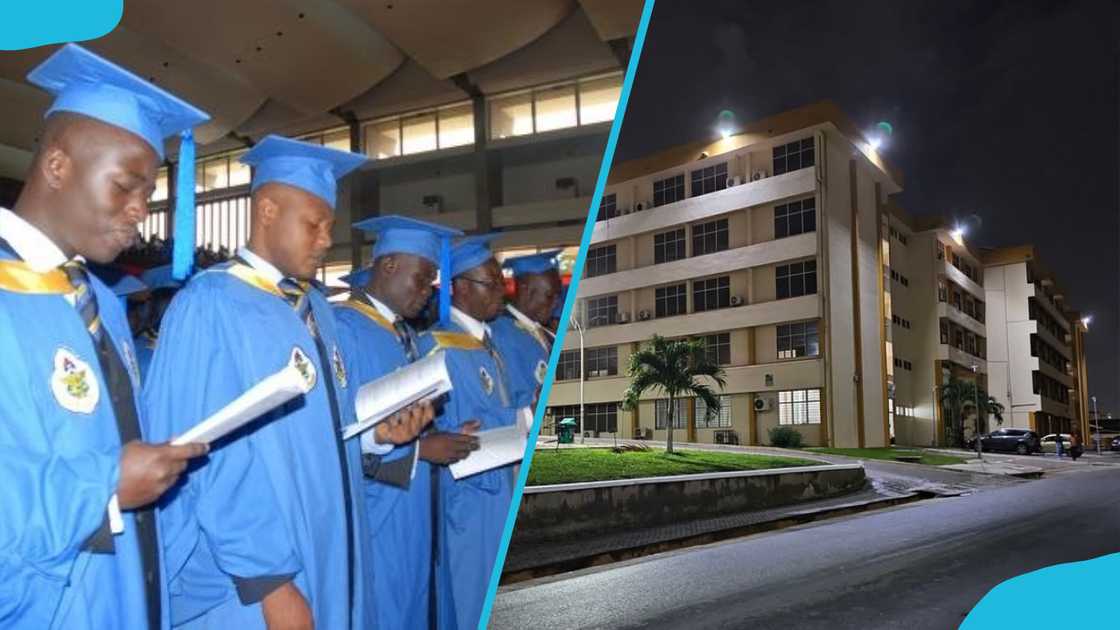
Source: UGC
If you have any complaints or inquiries, channel them via the following official contacts:
- Location: Visit the Basement, Casely-Hayford Building in Kumasi (1300-1400 hours, GMT)
- Email: [email protected]
- Phone: 0507211000 0507110005 0507110000 (0800-1700 work hours only)
For admissions enquiries, please contact KNUST as follows:
- Phone: +233 – (0) 240 – 130946 or +233 – (0) 500 – 482807
- Email: [email protected]
Where is KNUST located?
KNUST (Kwame Nkrumah University of Science and Technology) is in Kumasi, in the Ashanti region of Ghana.

Read also
National Tertiary Statistics Quiz: KNUST emerges winner of 2023 competition, earns golden trophy
What are the KNUST programmes and cut-off points?
KNUST offers a wide array of certificate programmes, diplomas, and undergraduate and postgraduate courses.
The Cut-off points, which vary by programme and are competitive, determine admission based on applicants’ aggregate scores from the WASSCE or SSSCE exams. These aggregates are calculated based on grades in core and elective subjects.
What are the KNUST programmes and fees?
KNUST offers a wide range of undergraduate and postgraduate programmes across various disciplines, including Engineering, Sciences, Built Environment, and Social Sciences. Fees vary depending on the programme of study and the student’s status (national or international, fee-paying or non-fee-paying).
Below is the estimated fee for some undergraduate programmes (Fee-Paying):
- Humanities and Social Sciences: Programmes like Akan, Culture & Tourism, English, and others have a total fee of GH¢5,643.40.
- Law (LLB): For degree holders, the fee is GH¢9,538.40, while for others it’s GH¢8,988.40.
- Business Administration: All specializations in Business Administration have a fee of GH¢6,138.40.
- Hospitality & Tourism Management: The total fee is GH¢6,938.40.
- Engineering: Programmes like Agricultural, Aerospace, Biomedical, Civil, etc., have fees around GH¢7,720.90.
- Art and Built Environment: This includes Human Settlement Planning, Real Estate, Land Economy, and others, with fees around GH¢6,112.40.
To find the exact fees for a particular programme, consult the official KNUST website or contact the institute.
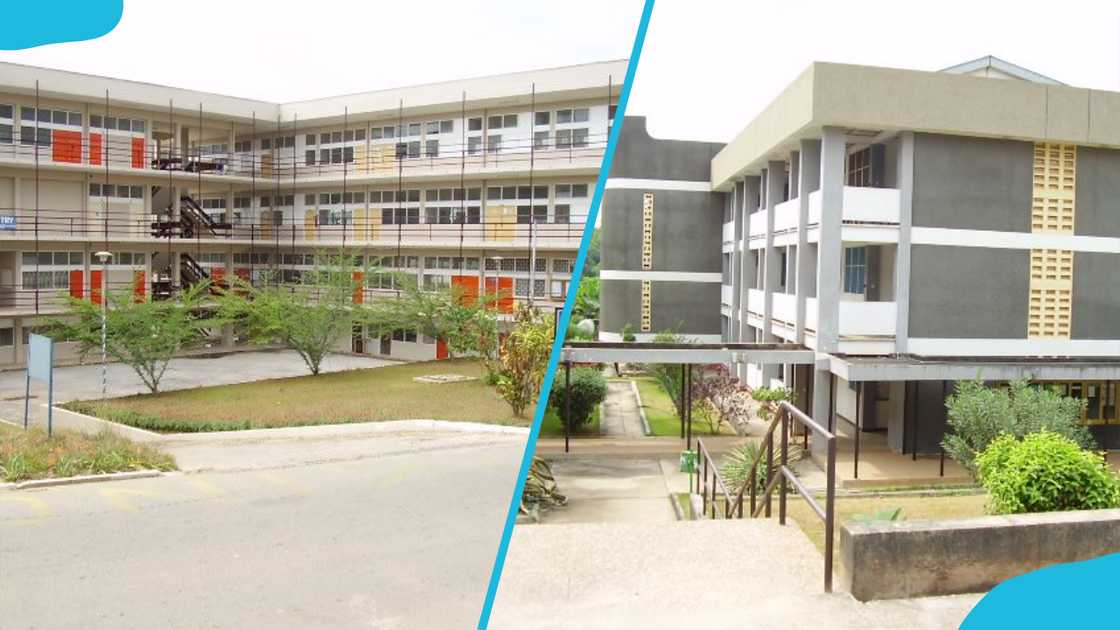
Source: UGC
What are the courses offered at KNUST and the cut-off points?
KNUST has not shared with the public a list of cut-off points for each arts course the institute offers, but generally, applicants need credit passes (A1-C6) in three core subjects (English, Mathematics, and either Integrated Science or Social Studies) and three elective subjects, including those relevant to the chosen programme.
Applicants with SSCE results must achieve a total aggregate of 24, and those with WASSCE results must attain a total aggregate of 36 points.
What are the KNUST courses and grades?
KNUST offers a wide array of undergraduate courses, including Bachelor of Science degrees in fields like Computer Science, Information Technology, and various science disciplines, as well as Bachelor of Arts degrees in Economics, Business Administration, and more.
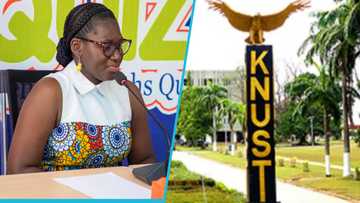
Read also
Dorcas Oyueley Kodie: Meet the KNUST lecturer who is a quiz mistress for 2023 JSMQ contest
Admission to these programmes typically requires specific subject requirements and grades in the WASSCE or equivalent qualifications. KNUST’s grading system is based on a student’s weighted average grades, from which the final grade is calculated and expressed as a percentage.
What are the KNUST programmes’ requirements for admission?
For WASSCE holders, the general admission requirements for KNUST undergraduate courses include:
- Core Subjects: Credits (A1-C6) in three core subjects, English Language, Mathematics, and Integrated Science.
- Elective Subjects: Credits in three elective subjects, including Mathematics for some programmes.
- Aggregate Score: A total aggregate score of 24 or better is typically required.
- Specific subject requirements: Certain programmes may have specific subject requirements and grade expectations (e.g., a B3 in Elective Mathematics for BSc. Computer Science)
What are the general arts courses offered in KNUST and their cut-off points?
The Kwame Nkrumah University of Science and Technology (KNUST) offers several General Arts courses within its College of Art and Built Environment, including Bachelor of Arts in Economics, Entrepreneurship, and Business-related programmes with Education.

Read also
Mangana Schools Debate Championship 2023: Achimota School wins Accra edition, receives trophy
However, KNUST does not publish specific cut-off points for courses in the way some other universities do. Admission is based on a combination of WASSCE results and specific subject requirements, with aggregate scores considered.
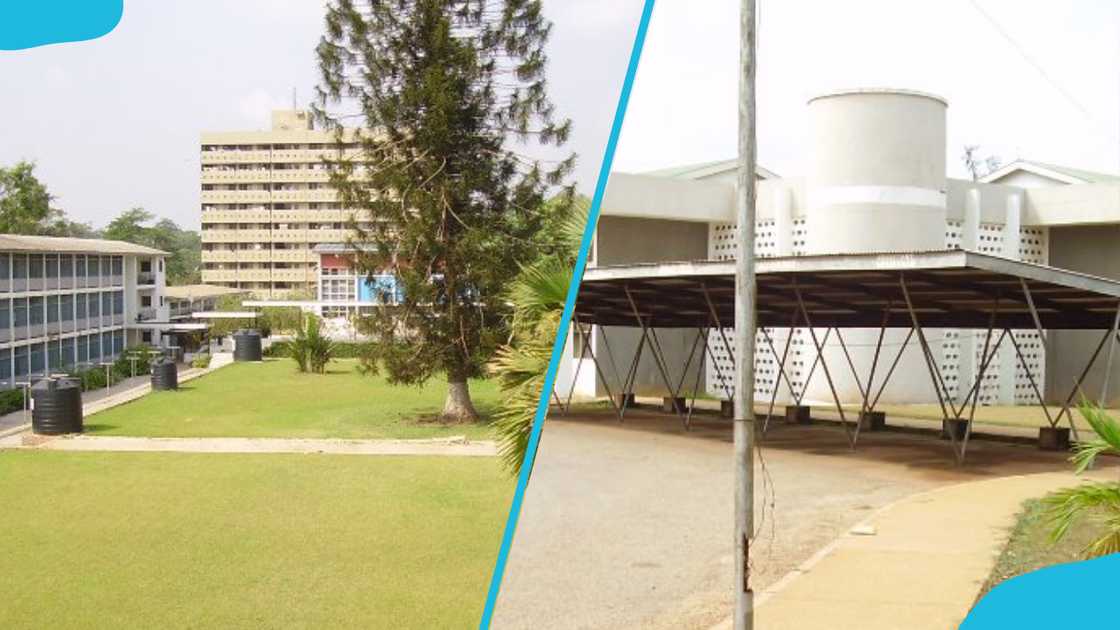
Source: UGC
What is the meaning of general art?
General arts is the generalized study of a broad range of humanities and social sciences programmes, delving into subjects such as literature, history, philosophy, social sciences, and the arts.
What are the courses under general arts?
General arts encompass diverse programmes, including English literature, history, philosophy, political science, sociology, psychology, economics, anthropology, languages, fine arts, music, theatre and performing arts, communication studies, and education.
Can a general art student transition to environmental science?
A general art student can transition to environmental science. Suppose your art background does not include the requirements for environmental science. In that case, you may need to take additional courses in biology, chemistry, geology, and related subjects to meet the entry requirements for an environmental science programme.

Read also
NSMQ 2023 quarterfinals: PRESEC-Legon obtains 63 points to enter semifinals over Accra Aca
Can a general art student become an engineer in Ghana?
A general art student can become an engineer, but only if they pursue each course independently. In such cases, you can finish your art course first and then start doing an engineering course.
Does KNUST accept general arts students for nursing?
KNUST does not accept General Arts students for their BSc Nursing program, according to a Facebook post from Voice of KNUST. The university requires applicants to have studied Biology, Chemistry, and Physics in their Senior High School (SHS) education. Other SHS subjects, such as General Arts, Visual Arts, Home Economics, and Business, are not eligible for the BSc Nursing programme at KNUST.
Knowing the full range of all general arts courses offered in KNUST allows prospective students to make informed decisions about their academic paths, understand the diverse career options available, and potentially identify interdisciplinary opportunities. It also helps in career planning by highlighting relevant skills and knowledge acquired through these programmes.

Read also
2023 NSMQ: Wesley Girls’ and five other schools that have qualified for semi-finals so far
Yen.com.gh compiled a list of the best senior high schools in the Eastern Region of Ghana. Senior high schools in Ghana are divided into public, private, and technical schools. There are several factors to consider when selecting one of these schools for your child.
If you are looking for good senior high schools to send your child to, the Eastern region of Ghana has some of the best institutes in the country. Some schools exclusively accommodate boys or girls, while others enrol both boys and girls (co-educational centres).
Source: YEN.com.gh
Source: Yen.com.gh


